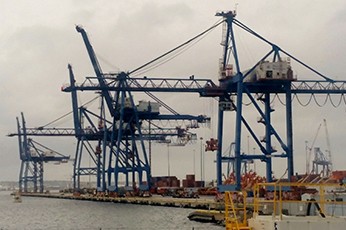



The 32 people gathered in the training room at Maryland New Directions (MND) worked in teams, trying to match the job title with the corresponding set of required skills: An import/export clerk needs ____? A crane operator needs ____? An international customer service representative needs ____?
Afterward, participant Nasir Bruce, 23, explained that the kickoff activity for MND’s Maritime Transportation and Logistics Training Program helped him see himself working in Port-related industries: “It made me feel the jobs were something I could do, that I have the skills to do.” And it is precisely that knowledge, and the sense of possibility, that MND staff and supporters are hoping to cultivate.
Maryland New Directions developed its Maritime Transportation and Logistics Training Program after learning about the extensive job opportunities in the $3.2 billion Port-related industry. “One of the employers with whom we worked reached out to say that there will be lots of retirement in and around the Port,” said Grace Lee, Executive Director of MND. “Current employees will be moving up to fill those spots and there will be a lot of openings at the entry level for folks to earn living wage jobs.”
Lee and Program Director Clair Watson jumped at the opportunity. They followed the career pathways identified by the Opportunity Collaborative and developed a program to train individuals to work in the transportation and logistics industry. By July 2014, Maryland New Directions had applied for and was awarded a Maryland Department of Labor, Licensing and Regulation EARN grant to screen and train 100 disadvantaged job seekers for jobs in Port-related industries. The Abell Foundation provided $120,000 in matching funds to help launch the program.
“There was no training like this,” said Lee, “but there was a real need, so we built the training from scratch.” The 90-hour course, designed in close collaboration with Port employers, provides 60-hours of “soft skill” training and 30-hours on “all things maritime.”
“The goal of the training,” explains Program Director Clair Watson, “is to give people a working knowledge of the port and everything that goes into it. We cover freight forwarding and logistics, material handling, stevedoring, key terms, key paperwork, customer service, and shipping/receiving.” Throughout the 90-hour program, individuals employed at the Port or in Port-related industries come and speak with trainees about a typical day in their work.
MND has successfully completed two cohorts of training (in October 2014 and March 2015) for the EARN grant with a total of 51 graduates. Of those, 41 obtained Transportation Worker Identification Credential (TWIC) cards, 32 received forklift training and certification, and 41 (or 75 percent of graduates) are now employed with an average wage of $14.88/hour. Its most recent cohort of 32 people began on August 17th.
Program participants must be 18 or older and have a high school diploma. They have to be underemployed or unemployed and pass a background check. MND also conducts a rigorous screening process to ensure that the individuals accepted into the program have the determination to complete the training and find employment. “This program costs $3,000 per student,” explains Lee. “We don’t want to waste resources. People with determination and motivation are more likely to succeed.”
Individuals like Nasir Bruce are eager for the chance. He graduated from Merganthaler Vocational High School in 2010 and has worked in food service, furniture delivery, and warehouses. “But I want a steady job where I can make a good living and support my daughter,” he said. “I think this program will help me do that. There are good jobs at the Port and I want to get one.”
The Abell Foundation salutes Maryland New Directions’ Maritime Transportation and Logistics Training Program for equipping Baltimore residents with the information and knowledge they need to find – and secure – living wage jobs in an opportunity-filled industry.